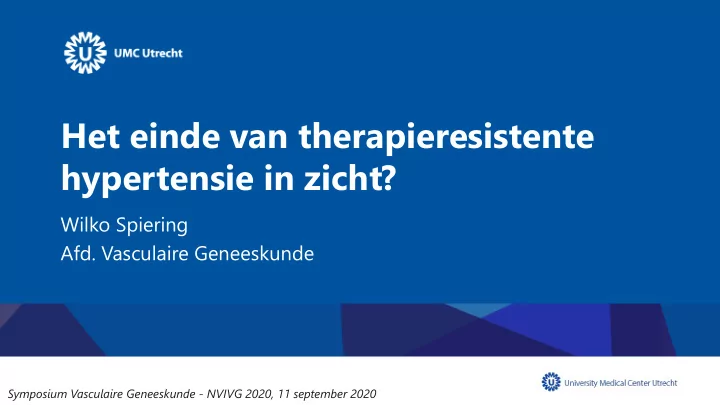

Het einde van therapieresistente hypertensie in zicht? Wilko Spiering Afd. Vasculaire Geneeskunde Symposium Vasculaire Geneeskunde - NVIVG 2020, 11 september 2020
Disclosures Research contract: none • Consulting: Vascular Dynamics • Other: none •
Hypertension control has plateaued NCD Risk Factor Collaboration (NCD-RisC), Lancet 2019
Definition resistant hypertension (ESC/ESH 2018) ‘Resistant to treatment when the recommended treatment • strategy fails to lower office SBP and DBP values to <140 mmHg and/or <90 mmHg, respectively, and the inadequate control of BP is confirmed by ABPM or HBPM in patients whose adherence to therapy has been confirmed’ Recommended treatment strategy should include: • – appropriate lifestyle measures – optimal or best-tolerated doses of three or more drugs, which should include a diuretic , typically an ACE inhibitor or an ARB , and a CCB Williams, Eur Heart J 2018
Increased risk in apparent resistant hypertension Groenland, submitted for publication
Work-up in resistant hypertension 1. Exclude pseudoresistant hypertension 2. Reverse contributing factors 3. Screen for secondary hypertension 4. Optimize pharmacotherapy 5. Consider device-based therapy
Work-up in resistant hypertension 1. Exclude pseudoresistant hypertension 2. Reverse contributing factors 3. Screen for secondary hypertension 4. Optimize pharmacotherapy 5. Consider device-based therapy
Causes of pseudoresistant hypertension Inaccurate BP measurement • White coat hypertension • Suboptimal antihypertensive therapy • Poor adherence to lifestyle aspects • Poor adherence to antihypertensive therapy •
Nonadherence in resistant hypertension Jung, J Hypertens 2013
Nonadherence in hypertension ~50% nonadherent to prescribed medication • 15-20% completely nonadherent to prescribed medication • Determinants of nonadherence: • – Younger age – Female sex – # of antihypertensive drugs prescribed – Total pill burden – Prescription of CCB Gupta, Hypertension 2017 Lawson, J Hypertens 2020
LC-MS/MS to measure adherence
Analysis for adherence in UMC Utrecht Liquid chromatography-tandem mass spectrometry (LC- • MS/MS) Only 100 μL plasma • Detects 34 antihypertensives in single run • Validated for Lower Limit of Quantification (LLOQ) • Measured in all new referred patients for difficult-to- • control hypertension Punt, J Chromatogr B Analyt Technol Biomed Life Sci 2019
Adherence in true refractory hypertension Uncontrolled OBP , despite: • – Effective doses of ≥5 different classes – Including long-acting thiazide-like diuretic – Including mineralocorticoid antagonist Siddiqui, Hypertension 2020
Adherence in true refractory hypertension Unattended AOBP ≥130/80 Mean 24hr ABPM ≥125/75 and mean awake ≥130/80 Siddiqui, Hypertension 2020
Adherence in true refractory hypertension -Adherence ~50% -Prevalence true refractory hypertension is rare Siddiqui, Hypertension 2020
Screening for adherence lowers BP Gupta, Hypertension 2017
Work-up in resistant hypertension 1. Exclude pseudoresistant hypertension 2. Reverse contributing factors 3. Screen for secondary hypertension 4. Optimize pharmacotherapy 5. Consider device-based therapy
Contributing factors in resistant hypertension Resistant hypertension
Sodium reduction in resistant hypertension Pimenta, Hypertension 2009
Work-up in resistant hypertension 1. Exclude pseudoresistant hypertension 2. Reverse contributing factors 3. Screen for secondary hypertension 4. Optimize pharmacotherapy 5. Consider device-based therapy
Secondary causes of resistant hypertension
Work-up in resistant hypertension 1. Exclude pseudoresistant hypertension 2. Reverse contributing factors 3. Screen for secondary hypertension 4. Optimize pharmacotherapy 5. Consider device-based therapy
Optimize pharmacotherapy Withdrawal interfering medications • Diuretic therapy: • – Higher doses – Long-acting thiazide-like in stead of hydrochlorothiazide – Loop diuretics when eGFR <30 ml/min/1.73m2 Combination therapy: • – Low dose combination vs. maximal uptitration – Triple FDC vs. dual FDC Mineralocorticoid receptor antagonists •
Core drug treatment strategy Williams, Eur Heart J 2018
PATHWAY-2 trial Williams, Lancet 2015
Work-up in resistant hypertension 1. Exclude pseudoresistant hypertension 2. Reverse contributing factors 3. Screen for secondary hypertension 4. Optimize pharmacotherapy 5. Consider device-based therapy
Device-based therapy of hypertension Renal denervation • Baroreflex amplification • Iliac AV anastomosis • Carotid body ablation • Deep brain stimulation • Transcutaneous median nerve stimulation • Cardiac neuromodulation therapy •
Device-based therapy of hypertension Renal denervation • Baroreflex amplification •
Renal denervation Radiofrequency-based renal denervation • Ultrasound-based renal denervation • Alcohol-mediated renal denervation •
Symplicity HTN-1 Krum, Lancet 2009
Symplicity HTN-2 Esler, Lancet 2010
Symplicity HTN-3 Bhatt, N Engl J Med 2014
Symplicity vs. Spyral catheter
SPYRAL HTN-OFF MED Böhm, Lancet 2020
SPYRAL HTN-ON MED Kandzari, Lancet 2018
Where are the renal nerves?
Ultrasound - Paradise system Ultrasonic Heating + Water Cooling Paradise Thermal Profile • Cool – protect the renal artery from the inside • Heat – ablate the renal nerves on the outside
RADIANCE-HTN SOLO Azizi, Lancet 2018
Meta-analysis sham-controlled RCTs in RDN Sardar, J Am Coll Cardiol 2019
Alcohol - Peregrine system
Device-based therapy of hypertension Renal denervation • Baroreflex amplification •
Baroreflex amplification Baroreflex activation therapy (‘electrical’) • Endovascular baroreflex amplification (‘stent’) • Selective vagal nerve stimulation •
Baroreflex in blood pressure control From: La Rovere, Vasc Pharmacol 2015
Baroreflex Activation Therapy (BAT)
Mechanism of action
Rheos pivotal trial Efficacy: • – Acute SBP responder rate at 6 months – Sustained responder rate at 12 months Safety: • – Procedure safety – BAT safety – Device safety
Barostim neo ongoing clinical trials Study n Design Primary outcome Completion date ESTIM-rHTN, 128 Randomized, 24-hr daytime SBP, Q1 2021 NCT02364310 open label incremental cost- (PROBE) effectiveness ratio at 12 months Nordic BAT, 100 Randomized, 24-hr SBP at 16 ?? NCT02572024 double blind months
EndoVascular Baroreflex Amplification (EVBA) Self-expanding nitinol MobiusHD • implant Reshapes the carotid sinus • to ‘square the circle’ Increases vessel radius • without over-expansion Increases stretch amplifying • baroreceptor signals to CNS
Change in blood pressure Office blood pressure Ambulatory blood pressure Spiering, Lancet 2017
Longterm effects in BP lowering van Kleef, submitted 2020
Selective vagal nerve stimulation Plachta, J Neural Eng 2014
Endothelin receptor antagonist: aprocitentan Trensz, J Pharmacol Exp Ther 2019
Angiotensinogen siRNA Uijl, Hypertension 2019
Digital health feedback system
Take home messages True resistant hypertension is probably rare • ‘It is the adherence, stupid!’ • Innovative antihypertensive treatments are needed more • than ever
Recommend
More recommend